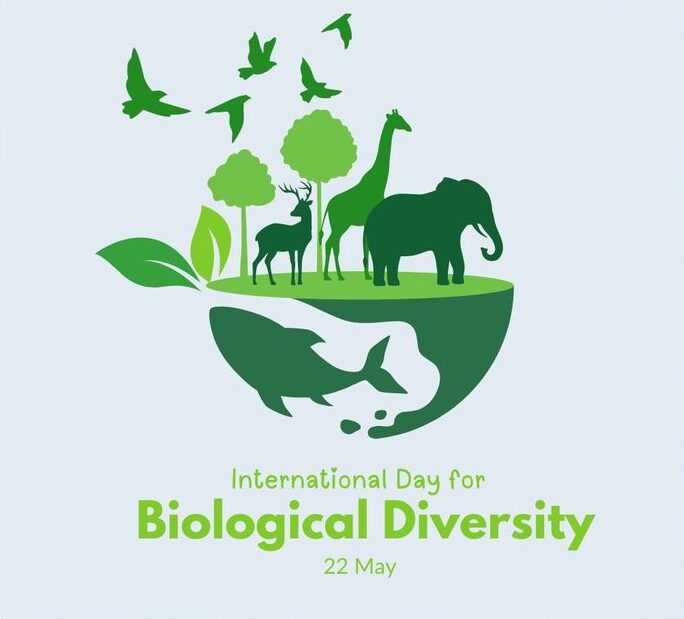International Day for Biological Diversity: Celebrating Our Planet’s Richness
Introduction
The International Day for Biological Diversity (IDB), observed every year on May 22nd, is a global celebration of biodiversity and the importance of protecting our planet’s variety of life. Established by the United Nations (UN) in 1993, this day aims to raise awareness about the significance of biological diversity to the environment and society, as well as the urgent need to address the threats to biodiversity. As the world faces growing environmental challenges, this day has never been more important in inspiring collective action to safeguard ecosystems, species, and the planet’s natural resources.
Biodiversity refers to the vast variety of life forms on Earth, including plants, animals, microorganisms, and the ecosystems they form. The well-being of all life on Earth is interconnected, and every species plays a crucial role in maintaining ecological balance. Unfortunately, habitat loss, pollution, climate change, and other human activities continue to threaten biodiversity, leading to the decline of many species.
What is International Day for Biological Diversity?
The International Day for Biological Diversity is a day dedicated to celebrating life on Earth. The aim of this day is to increase public understanding of biodiversity issues, including the importance of protecting the environment, conserving ecosystems, and preserving species. It also serves to highlight the need for urgent action to reverse the loss of biodiversity and ensure the health of our planet for future generations.
Each year, the United Nations selects a theme for the International Day for Biological Diversity to focus on specific areas of concern within the field of biodiversity conservation. Themes have included topics such as biodiversity and health, sustainable agriculture, ecosystem restoration, and the role of biodiversity in the fight against climate change.
History of International Day for Biological Diversity
The creation of the International Day for Biological Diversity was the result of the Convention on Biological Diversity (CBD), an international treaty signed in 1992 at the Earth Summit in Rio de Janeiro. The CBD aims to preserve biological diversity, promote its sustainable use, and ensure the fair and equitable sharing of benefits arising from the use of genetic resources. To commemorate the adoption of the CBD, the UN declared May 22nd as International Day for Biological Diversity in 1993.
Since its inception, this day has been a key moment for raising awareness of the critical importance of protecting biodiversity and encouraging governments, businesses, and individuals to take steps toward preserving nature. The CBD has also played a pivotal role in creating global frameworks, such as the Aichi Biodiversity Targets, which set measurable goals for biodiversity conservation.
Facts About Biodiversity
- Biodiversity Supports Ecosystems: Biodiversity is essential for healthy ecosystems. From forests to oceans to grasslands, different ecosystems rely on the variety of species to function properly. These ecosystems provide services such as food production, clean water, pollination of crops, and climate regulation.
- Species Extinction is Accelerating: According to the Intergovernmental Science-Policy Platform on Biodiversity and Ecosystem Services (IPBES), the world is currently experiencing an unprecedented rate of species extinction. It is estimated that around one million species are at risk of extinction due to human activities.
- Biodiversity and Human Health: Biodiversity directly impacts human health by providing medicines, food, and clean air. Over 50% of prescription drugs are derived from plants, and many of the foods we eat depend on pollinators, such as bees, butterflies, and birds.
- The Economic Value of Biodiversity: The global economy is deeply tied to biodiversity. Many industries, including agriculture, forestry, fishing, and tourism, rely on healthy ecosystems and biodiversity. Protecting biodiversity is not only essential for the environment but also for global economic stability.
- Threats to Biodiversity: The main threats to biodiversity include habitat loss, climate change, pollution, and overexploitation of natural resources. These activities disrupt ecosystems and contribute to the decline of species.
Significance of International Day for Biological Diversity
The significance of International Day for Biological Diversity lies in its ability to bring attention to the urgent need for conservation efforts and biodiversity protection. The day serves as a platform for a variety of stakeholders to come together and discuss the challenges and solutions to biodiversity loss.
- Raising Awareness: One of the key roles of IDB is to raise global awareness about the importance of biodiversity. By engaging the public through education and outreach, it helps people understand how their actions impact the environment and encourages them to adopt more sustainable lifestyles.
- Mobilizing Action: IDB is an opportunity for governments, organizations, and communities to take action on biodiversity conservation. Whether through policy changes, local conservation efforts, or supporting biodiversity-related projects, this day calls for tangible steps to protect nature.
- Promoting Sustainable Practices: The International Day for Biological Diversity encourages industries and individuals to adopt sustainable practices that minimize harm to ecosystems and wildlife. This includes sustainable agriculture, reducing pollution, and creating conservation areas to protect endangered species.
- Highlighting the Urgency: Biodiversity loss is a pressing global issue that requires immediate attention. International Day for Biological Diversity highlights the urgency of taking action to protect the planet’s rich variety of life, emphasizing that the time to act is now.
Impact of International Day for Biological Diversity on Daily Life
IDB plays a significant role in influencing daily life by inspiring individuals to make informed choices that benefit the environment. On a personal level, the observance of IDB encourages people to think about their relationship with nature and the importance of taking care of the planet. Some ways that this day impacts daily life include:
- Promoting Eco-Friendly Habits: People can contribute to protecting biodiversity by making eco-friendly choices, such as reducing waste, conserving water, and supporting sustainable products.
- Supporting Conservation Initiatives: Many individuals participate in local biodiversity-related projects, such as tree planting, wildlife protection programs, or volunteering for environmental organizations.
- Adopting Sustainable Diets: By consuming sustainably sourced food, such as organic or locally grown produce, individuals can reduce their impact on ecosystems and support biodiversity preservation.
- Educating Others: World Biodiversity Day encourages the sharing of knowledge and raising awareness about the importance of biodiversity. Many schools, NGOs, and social media platforms promote education on this subject.
How to Observe International Day for Biological Diversity
There are several ways you can participate in International Day for Biological Diversity:
- Learn about Biodiversity: Educate yourself and others about biodiversity, its importance, and how it affects ecosystems, human health, and the economy.
- Support Conservation Projects: Get involved with or donate to organizations working to conserve species and habitats. Participate in tree-planting events or clean-up campaigns to restore ecosystems.
- Make Sustainable Choices: Adopt sustainable practices in your daily life. Choose eco-friendly products, reduce plastic waste, and conserve water to help protect natural resources.
- Advocate for Policy Change: Support policies and initiatives that aim to protect biodiversity, such as stricter environmental regulations or local wildlife protection laws.
Conclusion
The International Day for Biological Diversity serves as a reminder of the invaluable role that biodiversity plays in maintaining a healthy planet and supporting human life. As we continue to face challenges such as climate change, habitat destruction, and pollution, the need to protect biodiversity is more urgent than ever. This day offers an opportunity for collective action, empowering individuals, communities, and governments to take steps toward conserving the planet’s precious natural resources.
By embracing sustainable practices, supporting conservation efforts, and advocating for stronger environmental policies, we can work together to preserve the incredible diversity of life that sustains us all.










